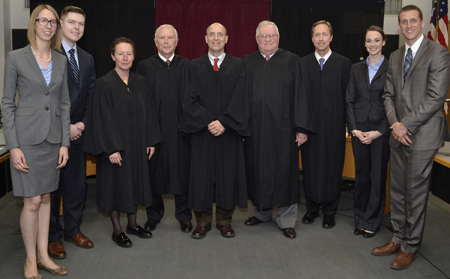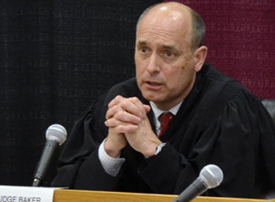Law students argue before high-level appeals court
When UW Law professors invited second-year law students Curtis Hinca and Veronica Sustic to participate in the appeals phase of a court-martial, they knew it was the chance of a lifetime.
The U.S. Court of Appeals for the Armed Forces brought a Fourth Amendment search and seizure case from its docket to University of Wisconsin Law School this spring, as part of the court’s judicial outreach program.

Students Catie White & Curtis Hinca (left) wrote a brief
supporting the appellant; Veronica Sustic & Jake Blair (right)
wrote in support of the government's case.
That’s where Hinca and Sustic came in. Both signed on to serve as amicus curiae, or friends of the court, in the matter of U.S. v. Levi Keefauver. Working with two other law students and two professors, they were tasked with filing legal briefs ahead of the hearing, which involved a U.S. Army specialist convicted in 2012 of possession with intent to distribute marijuana.
Students formed two groups and wrote separate briefs: one on behalf of Keefauver, the appellant; the other on behalf of the government. When the court agreed to hear oral argument on both briefs, Hinca and Sustic were selected to address the court.
During the proceedings, the students had ten minutes each to present their briefs, following 20-minute arguments from the corresponding counsels for the appellant and the government. Judges asked a series of challenging, rapid-fire questions that often prevented students — as well as the court-appointed Judge Advocates — from delivering their prepared remarks.
Hinca expected the scrutiny. “It’s a tough case,” he says.
Keefauver’s appeal hinges on whether evidence the Army’s Criminal Investigation Command discovered during a sting operation should have been admitted at trial. As part of the sting, law enforcement secured a warrant to search on Keefauver’s property for a package they believed contained marijuana, as well as the vicinity immediately surrounding the package. But when Keefauver’s teenaged stepson, who brought the package into his house, began shouting obscenities at an agent, the agent handcuffed the teen and performed a sweep of the entire house.
At issue, says Hinca, is the limits placed by law on such ‘protective sweeps.’ In a sweep, agents must be able to articulate the facts leading them to believe another person is occupying the scene, someone who might attempt to do the agents harm.
“In this instance, they didn’t find other people in the house, but they did find guns, more drugs and drug paraphernalia, and all that evidence was used against the defendant at trial,” he says.
Hinca’s brief supported the appellant’s claim that the sweep violated his constitutional right to privacy, and that any evidence collected as a result should be suppressed. Agents conducted the sweep on a weekday, he argues, when Keefauver’s family were all likely at work or school; and before the stepson came home, they maintained surveillance for several hours, during which no one entered or left the residence.
Arguing on the government’s behalf, Sustic says the facts known to agents at the time of the sweep established a reasonable suspicion of risk. In particular, they suspected the stepson’s outburst may have been an attempt to alert others in the house of their presence. She also cites earlier testimony from a drug trafficking expert who told the court, “guns follow money.”
“In demonstrating a reasonable suspicion of the risk inherent in entering suspects’ homes, the government has a fairly low burden of proof,” Sustic says. “That’s the strength of our case."

Chief Judge James Baker
Chief Judge James Baker presides over the four other judges who sit on the court. The nation's highest military court, it was established to provide civilian oversight of the military justice system through the appellate process.
Baker says he hopes the experience makes an impact on UW Law community members, whether they participated in the hearing or simply observed it: “If even one student is inspired in their own way to uphold and defend the Constitution, however they wish to do so, that would have made this outreach trip entirely useful.”
As for Sustic and Hinca, both were considering public service careers before they became friends of Baker’s court. Whether they pursue careers as appellate attorneys remains to be seen.
“Right now, the terror is too fresh to think about the next oral argument,” jokes Sustic.
Though she and Hinca kept their cool before the judges, each admits to moments of anxiety after agreeing to participate. “But how can a person say no?” Sustic asks. “The whole process was hard, and it was rigorous, and I knew that at the end, there would be a culminating stressful moment. At the same time, I felt so lucky and so glad to get to do this.”
For now, they’ll be watching the court’s website for its decision on U.S. v. Keefauver, which Baker says will come in due course.
“We have no clock other than our own sense of duty to keep justice moving,” he says.
Submitted by Tammy Kempfert on July 9, 2019
This article appears in the categories: Features